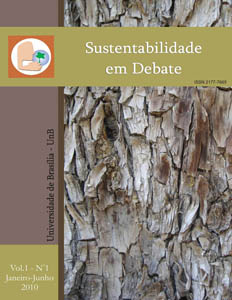Fatores Político-Econômicos do Desmatamento na Amazônia Oriental
DOI :
https://doi.org/10.18472/SustDeb.v1n1.2010.728Mots-clés :
Desenvolvimento sustentável, Política ambiental, AgronegócioRésumé
Este estudo investigou as relações entre aspectos político-econômicos e o desmatamento na Amazônia Oriental, com o propósito de avaliar os principais fatores primários que contribuíram para o desmatamento recente da floresta regional ou para a sua proteção. Metodologicamente, utilizou-se de regressão múltipla com dados coletados por meio de uma série de corte (cross-section) das informações dos municípios localizados na porção oriental do bioma Amazônia, dados desses válidos para o período 2007/2008. Os resultados evidenciaram que os principais fatores associados em primeiro nível à s taxas de desmatamento na região são a área agropecuária, as produções de madeira e carvão vegetal, a produção extrativista não-madeireira, a distância ao escritório regional do Ibama mais próximo, as áreas protegidas e o estoque florestal. Neste sentido, os estudos sobre o desmatamento da Amazônia devem ampliar a atenção quanto à s atividades econômicas que podem proteger ao invés de destruir a floresta.
Téléchargements
Références
ALVES, D. S. O processo de desmatamento na Amazônia”. Parcerias Estratégicas, v. 12, 2001, p. 259-275.
ANGELSEN, A.; KAIMOWITZ, D. Rethinking the causes of deforestation: lessons from economic
models. The W orld Bank Research Observer, v. 14, n. 1, 1999, p. 73-98.
ARIMA, E. Y.; WALKER, R. T.; PERZ, S. G.; CALDAS, M. Loggers and Forest Fragmentation: Behavioral Models of Road Building in the Amazon Basin. Annals of the Association of American Geographers, v. 95, n. 3, 2005, p. 525”“541.
BARBIER, E. B. The economics of tropical deforestation and land use: an introduction to the
special issue”. Land Economics, v. 77, n. 2, 2005, p. 155-171.
BARRETO, P. et al. Pressão humana na floresta amazônica brasileira. Belém: World Resource Institute.
BECKER, B. K. Amazônia: geopolítica na virada do III milênio. Rio de Janeiro: Garamond, 2004.
BECKER, B. K. Geopolítica da Amazônia”. Estudos Avançados, v. 19, n. 53, 2005, p. 71-86.
BÖRNER, J.; Mendoza, A.; Vosti, S. A. Ecosystem services, agriculture, and rural poverty
in the Eastern Brazilian Amazon: interrelationships and policy prescriptions”. Ecological Economics, v. 64, 2007, p. 356-373.
BRASIL. Plano Amazônia Sustentável: diretrizes para o desenvolvimento sustentável da Amazônia Brasileira”. Brasília: Ministério do Meio Ambiente, 2007.
BÜRGI, M.; Hersperger, A. M.; Schneeberger, N. Driving forces of landscape change ”“ current
and new directions. Landscape Ecology, v. 19, 2004, p. 857-868.
CATTANEO, A. Inter-regional innovation in Brazilian agriculture and deforestation in the Amazon: income and environment in the balance. Environment and Development Economics, v. 10, 2001, p. 485”“511.
CLARK, S., Bolt, K., Campbell, A. Protected areas: an effective tool to reduce emissions from deforestation and forest degradation in developing countries? Cambridge, U.K, 2008. Working Paper, UNEP. World Conservation Monitoring Centre.
Téléchargements
Publié-e
Comment citer
Numéro
Rubrique
Licence
(c) Tous droits réservés Sustentabilidade em Debate 2010

Cette œuvre est sous licence Creative Commons Attribution - Pas d'Utilisation Commerciale - Pas de Modification 4.0 International.
SUSTAINABILITY IN DEBATE – Copyright Statement
The submission of original scientific work(s) by the authors, as the copyright holders of the text(s) sent to the journal, under the terms of Law 9.610/98, implies in the concession of copyrights of printed and/or digital publication to the Sustainability in Debate Journal of the article(s) approved for publication purposes, in a single issue of the journal. Furthermore, approved scientific work(s) will be released without any charge, or any kind of copyright reimbursement, through the journal’s website, for reading, printing and/or downloading of the text file, from the date of acceptance for publication purposes. Therefore, the authors, when submitting the article (s) to the journal, and gratuitous assignment of copyrights related to the submitted scientific work, are fully aware that they will not be remunerated for the publication of the article(s) in the journal.
The Sustainability in Debate Journal is licensed under Creative Commons License – Non-Commercial-No-Derivation Attribution (Derivative Work Ban) 3.0 Brazil, aiming at dissemination of scientific knowledge, as indicated on the journal's website, which allows the text to be shared, and be recognized in regards to its authorship and original publication in this journal.
Authors are allowed to sign additional contracts separately, for non-exclusive distribution of the works published in the Sustainability in Debate Journal (for example, in a book chapter), provided that it is expressed the texts were originally published in this journal. Authors are allowed and encouraged to publish and distribute their text online, following publication in Sustainability in Debate (e.g. in institutional repositories or their personal pages). The authors expressly agree to the terms of this Copyright Statement, which will be applied following the submission and publishing by this journal.






